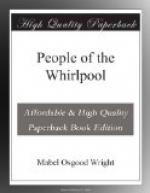“That fatal twentieth year, the time of my overthrow, brought me one good gift, your father’s friendship. It was a strange chance, that meeting, and it was my love of hearing of past events and the questions concerning them that brought it about. Has your father ever told you of it?
“Likely not, for his life work has been the good physician’s, to bring forth and keep alive, and mine the antiquarian’s, dreaming and groping among ruins for doubtful treasure of fallen walls.
“My mother came of English, not Knickerbocker stock like my father, though both belong distinctly to New York; and female education being in a somewhat chaotic state between the old regime and new, her parents, desirous of having her receive the genteel polish of courtly manners, music, and dancing, sent her, when about fifteen, to Mrs. Rowson’s school, then located at Hollis Street, Boston. The fame of this school had travelled far and wide, for not only had the preceptress in her youth, as Susanna Haswell, been governess to the children of the beautiful Georgiana, Duchess of Devonshire, one of the most accomplished women of her day, and profited by her fine taste, but her own high morals and literary gifts made her tutorship a much sought privilege.
“While there my mother met the little New England girl who was long afterward to become your grandmother. She had also come to study music, for which she had a talent. My mother related to me, when I was a little lad and used to burrow in her carved oak treasure chest and beg for stories of the articles it contained, many fascinating tales of those two school years, a pretty colour coming to her cheeks as she told of the dances learned together, pas-de-deux and minuet, from old ‘Doctor’ Shaffer, who was at the time second violin of the Boston Theatre, as well as authority in the correct methods of bowing and courtesying for gentlewomen. Your grandmother married first, and the letter telling of it was stored away with others in the oak chest.
“Some months before the steamboat accident that shattered my nerves, and preceded the long illness, I was browsing at a bookstall, on my way up from college homeward, when I came across a copy of Charlotte Temple—one of the dozen later editions—printed in New York by one R. Hobbs, in 1827, its distinguishing interest lying in a frontispiece depicting Charlotte’s flight from Portsmouth.
“The story had long been a familiar one, and I, in common with others of many times my age and judgment, had lingered before the slab that bears her name in the graveyard of old Trinity, and sometimes laid a flower on it for sympathy’s sake, as I have done many times since.
“On my return home I showed the little book to my mother, and as she held it in her hinds and read a word here and there, she too began to journey backward to her school days, and asked my father to bring out her treasure chest, and from it she took her school relics,—a tattered ribbon watch-guard fastened by a flat gold buckle that Mrs. Rowson had given her as a reward for good conduct, and a package of letters. She spent an hour reading these, and old ties strengthened as she read. I can see her now as she sat bolstered by pillows in her reclining chair, a writing tray upon her knees, penning a long letter.




